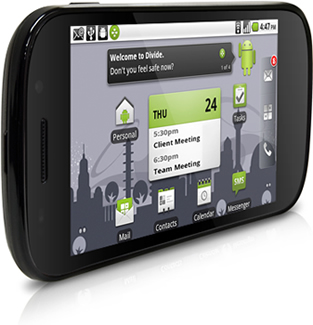Enterproid keeps personal and work data separate
Mar 8, 2011 — by LinuxDevices Staff — from the LinuxDevices Archive — viewsEnterproid is the latest solution to crack the mobile device management market, focusing first on Android with its Divide platform. Divide is different, says Enterproid, because it functions at the application layer, offering greater flexibility, and that could mean trouble for enterprise phones like RIM's BlackBerry, according to this analysis.
Even though its U.S. smartphone market share is shriveling, Research In Motion still commands the bulk of the enterprise mobile handset market. The problem is that while RIM has spent a decade grooming corporations to get BlackBerries into the hands of corporate road warriors, iPhone and Android handsets are popping up like mushrooms all over the workforce.
This consumerization of IT has increased the need for companies to address age-old security concerns that RIM had mitigated with its BlackBerry Enterprise Server and other tools for locking down enterprise data. While the pressing need to secure iPhone and Android gadgets, including tablets, is boosting the market for Sybase, Good Technology, and Zenprise, it's also opening the door for new entrants. Enter Enterproid, whose value proposition is letting users create and keep personal and professional profiles on a single smartphone or tablet.

Enterproid Divide running on a Nexus S phone
Of course, splitting work and personal profiles on one smartphone has been done before, industry analyst Jack Gold told eWEEK. "This is really the 'Holy Grail' of user-liable devices in the enterprise — making a 'lock box' for enterprise data on the device. Others have done similar things [e.g., Sybase, TrustDigital, and Good] by building a unique and independent corporate suite that resides in a 'sandboxed' environment," Gold said.
According to an email from an Enterproid rep, meanwhile, instead of providing simply a virtualized software tool, Enterproid has built Divide to function at the application layer. "We've done this because, in our tests, virtualization (and by this we mean splitting the kernel and running two versions of the OS side by side) is incredibly resource-intensive (especially when it comes to things like battery drain) and introduces issues when it comes to handling things like incoming calls (in which case you'd have two OSes fighting over who answers the call)," the Enterproid exec told eWEEK.
Companies and individuals can download Divide to any Android 2.2 or greater device and begin using the platform in minutes, says the company. Building Divide at the app layer afforded Enterproid flexibility it wouldn't have by securing partnerships with device makers, such as Apple or RIM.
IT managers can use Divide to enforce policies and manage encryption, device location, and remote wipe, while end users can manage apps and settings, as well as device location and remote wipe. Finally, Divide is managed in the cloud, so businesses needn't purchase new servers to run the platform, says the company.
Ultimately, what is really needed to lock up devices that workers use for business is a virtualized platform that has stove-piped implementations for the enterprise and personal side, Gold told eWEEK. He noted that OK Labs, which produces an OKL4 virtual machine capability for various devices, is what's needed.
OK Labs, Sybase, Good, Zenprise, and dozens more dot the mobile enterprise management landscape. Will Enterproid thrive in a crowded market? It's way too early to say, though the company did win a sort of best-in-show prize at Demo 2011 Feb. 28, taking home $150,000 in Qualcomm Ventures' QPrize venture investment competition. The key will be landing big contracts.
Google blasts malware remotely
In other Android-related security news, on Mar. 5, Google moved to terminate last week's DroidDream malware attacks by invoking its remote removal application tool to remotely wipe DroidDream, as well as 58 malicious applications that affected smartphones based on Android 2.1 and earlier versions. A follow-up analysis piece by eWEEK's Wayne Rash argues that the increasing malware on Android Market demonstrates the downside of an open platform in which apps "come from just about anywhere."
Clint Boulton is a writer for our sister publication eWEEK.
This article was originally published on LinuxDevices.com and has been donated to the open source community by QuinStreet Inc. Please visit LinuxToday.com for up-to-date news and articles about Linux and open source.